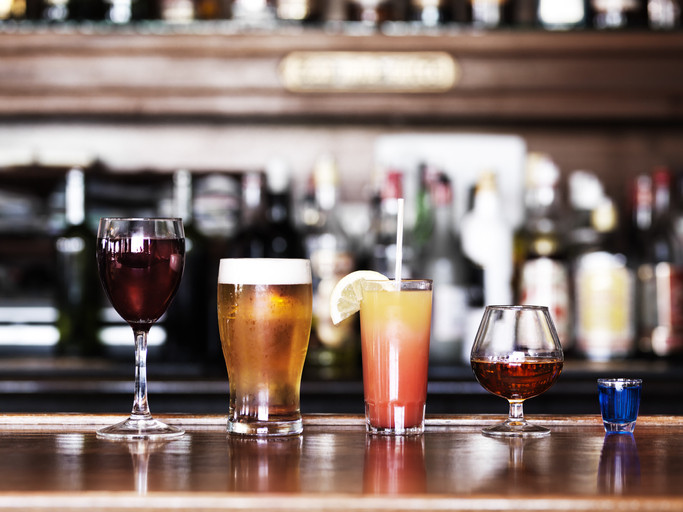Is alcohol and weight loss surgery a risky combination?
A study finds gastric bypass contributes to higher rates of alcohol-related hospitalizations.

For people with obesity, weight-loss surgery can reverse or greatly improve many serious health issues, such as diabetes, high blood pressure, and pain. But these procedures also change how the body metabolizes alcohol, leaving people more likely to develop an alcohol use disorder. A new study finds that one type of surgery, gastric bypass, may increase the dangers of drinking much more than other weight-loss strategies.
"Alcohol-related problems after weight-loss surgery are a known risk. That's one reason we require people to abstain from alcohol for at least six months — and preferably a full year — before any weight-loss surgery," says Dr. Chika Anekwe, an obesity medicine specialist at the Harvard-affiliated Massachusetts General Hospital Weight Center. The new findings are interesting and make sense from a biological perspective, given the differences in the surgeries, she adds.
How does weight loss surgery affect alcohol absorption?
Weight-loss surgeries dramatically reduce the size of the stomach.
- For a sleeve gastrectomy, the most common procedure, the surgeon removes about 80% of the stomach, leaving a banana-shaped tube.
- For a gastric bypass, a surgeon converts the upper stomach into an egg-sized pouch. This procedure is called a bypass because most of the stomach, the valve that separates the stomach from the small intestine (the pylorus), and the first part of the small intestine are bypassed.
The lining of the stomach contains alcohol dehydrogenase, an enzyme that breaks down alcohol. After weight-loss surgery, people have less of this enzyme available. So drinking wine, beer, or liquor will expose them to a higher dose of unmetabolized alcohol. Some alcohol is absorbed directly from the stomach, but most moves into the small intestine before being absorbed into the bloodstream.
After a sleeve gastrectomy, the pyloric valve continues to slow down the passage of alcohol from the downsized stomach to the small intestine. But with a gastric bypass, the surgeon reroutes the small intestine and attaches it to the small stomach pouch, bypassing the pyloric valve entirely. As a result, drinking alcohol after a gastric bypass can lead to extra-high blood alcohol levels. That makes people feel intoxicated more quickly and may put them at a higher risk of alcohol use disorders, says Dr. Anekwe.
Findings from the study on weight loss surgery and alcohol
The study included nearly 7,700 people (mostly men) from 127 Veterans Health Administration centers who were treated for obesity between 2008 and 2021. About half received a sleeve gastrectomy. Nearly a quarter underwent gastric bypass. Another 18% were referred to MOVE!, a program that encourages increased physical activity and healthy eating.
After adjusting for participants' body mass index and alcohol use, researchers found that participants who had gastric bypass were 98% more likely to be hospitalized for alcohol-related reasons than those who had sleeve gastrectomy, and 70% more likely than those who did the MOVE! program. The rate of alcohol-related hospitalizations did not differ between people who had sleeve gastrectomy and those who did the MOVE! program.
The health harms of alcohol use disorder
Alcohol use disorder can lead to numerous health problems. Some require hospitalization, including alcoholic gastritis, alcohol-related hepatitis, alcohol-induced pancreatitis, and alcoholic cardiomyopathy. As the study authors note, people who had gastric bypass surgery had a higher risk of being hospitalized for an alcohol use disorder, even though they drank the least amount of alcohol compared with the other study participants. This suggests that change in alcohol metabolism resulting from the surgery likely explains the findings.
Advice on alcohol if you've had weight-loss surgery or are considering it
"We recommend that people avoid alcohol completely after any type of weight-loss surgery," says Dr. Anekwe. A year after the surgery, an occasional drink is acceptable, she adds, noting that most patients she sees don't have a problem with this restriction.
People who undergo weight-loss surgeries have to be careful about everything they consume to ensure they get adequate amounts of important nutrients. Like sugary drinks, alcohol is devoid of nutrients — yet another reason to steer clear of it.
Gastric bypass has become less popular than sleeve gastrectomy over the past decade, mostly because it's more invasive and slightly riskier. While the new study suggests yet another downside of gastric bypass, Dr. Anekwe says it can still be a viable option for people with severe obesity, as bypass leads to more weight loss and better control of blood sugar than the sleeve procedure.
About the Author

Julie Corliss, Executive Editor, Harvard Heart Letter
Disclaimer:
As a service to our readers, Harvard Health Publishing provides access to our library of archived content. Please note the date of last review or update on all articles.
No content on this site, regardless of date, should ever be used as a substitute for direct medical advice from your doctor or other qualified clinician.















